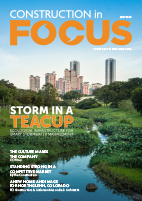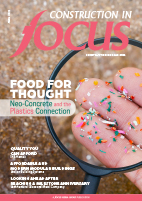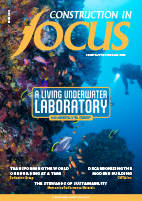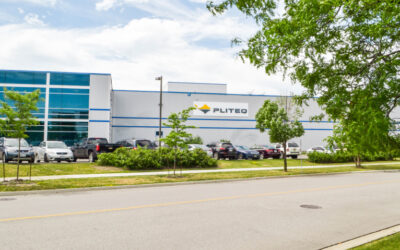The Overly Door Company, a certified ISO 9001:2015 company located in Greensburg, Pennsylvania, has roots going all the way back to 1888. The company is recognized for having the widest range of specialty door, window, and barrier systems in the world, along with a full range of hardware accessories, designed and manufactured on a project basis for government, commercial, and industrial markets.
Architects, engineers, general contractors, and distributors alike turn to Overly products, which they know they can trust to achieve the exact specification their facility requires. Whether the need is for an acoustical, blast, and bullet-resistant, radiation shielding, or GSA vault door, or an acoustical or bullet-resistant window system, the company can supply it from its standard product catalog or custom design and manufacture it to meet any size and specification.
Most recently Overly has partnered with companies that make RF products to supply them with critical acoustical technologies and components to produce a door that protects data and intelligence for sensitive compartmented information facilities. In addition, the company supplies an extensive range of hardware ranging from breaker bars to bullet-resistant gun and voice ports. These products, which meet stringent testing protocols, are installed across the U.S. by certified installers who have received training in best practices and techniques.
A rich history
“It’s exciting, almost unheard of, to celebrate an anniversary of 135 years as Overly Door Company does this year, and quite remarkable in a time when so many independent and/or family owned businesses are being bought up by large multinational companies. “We’ve seen this time and time again,” says Jonathan (Jon) Reese, President of Sales. “Great manufacturing companies are purchased by larger entities and the culture that built the company is lost. Bottom lines are paramount, numbers rule the day, and customer service and quality suffer. We’re proud of the fact that Overly remains a privately held family business where success is predicated on a quality product and ultimate customer satisfaction.”
Jon is co-owner of the company, which he joined in 2000, along with his brother Tyler, President of Operations; their sister Heather Reese Clemens, who oversees the Human Resources department and heads up the Overly Manufacturing Company, a separate entity specializing in metal roofing, wall panel, and rain-screen systems; and their father, Terry Reese, now semi-retired, who, along with his late brother David, purchased the company in 1991.
How the Overly Door Company developed from its beginnings in 1888 is a story worth sharing.
Master tinsmith William Fisher Overly started the W.F. Overly Company around the roofing business, which he expanded to the theatre marquee and church steeple market, and was granted one of the first Underwriters Laboratories listings for fire doors—wood cores encased in galvanized steel sheets.
In 1935, the company assets were sold to H.W. Wehe, who fine-tuned the name to Overly Manufacturing Company and left tin roofing behind with the development of proprietary batten metal and slate roof systems, which included several projects for the Pentagon.
This government connection led to Overly being assigned to work on the Manhattan Project, specifically to develop and construct the copper cooling jackets used in uranium processing for the first atomic bomb. Another wartime project involved designing and manufacturing the bulkheads for LSTs (landing ship tanks) to deliver men and equipment onto far-flung beaches across the Pacific war zone.
After the war, Overly used its acquired expertise to develop new products, including hollow metal fire doors and acoustical doors, and by the 1970s had emerged as a door industry leader.
Following its acquisition by the Reese family in 1991, the company was divided into two entities, Overly Manufacturing and Overly Door. Overly Door became the first acoustical door manufacturer to obtain a Sound Transmission Class 52-rating for door construction in a 1 ¾” door and built upon that design to offer ratings as high as STC55 (in various thicknesses) which cancel out even the loudest of noises. For the most challenging acoustical environments, tandem doors which have a rating of STC57 are available.
Under the second generation of Reese ownership and a staff of skilled engineers, the company continues to develop and manufacture state-of-the-art products, including blast/pressure, bullet-resistant, radiation shield, and attack-resistant GSA vault and armory doors that meet Federal Government standards.
A positive culture
Culture plays a critical role in any company’s success, says Jon, who considers it a “two-part thing. We view our employees as family and that means we have a very low turnover rate. At the same time, we’ve been an innovative company with our products, procedures, and software modeling and so we rely heavily on the input of our staff of 32 employees, who include structural and mechanical engineers,” he shares.
“We’re not a monarchy or a dictatorship when it comes to making decisions and moving forward with products and innovations. It’s a real team effort, and we rely on our employees to lead the way. Our father and uncle had an open-door policy; if you had an idea or a complaint, the door was open. Not only was it okay to come in and talk, it was expected, and that holds true for us today.”
Says Tyler, “I want to empower our employees and our experts to do what they do best—give them the tools and resources they need to do their job and continue to be creative as to how we make our products. We want to know how we can do things better, whether it’s equipment, engineering, software, or plant layout. I think perfection may not be attainable, but progress is non-negotiable.”
Adds Heather, “What makes Overly special is our focus on family first. A major component in creating a successful business model is creating a happy work environment. We do this by enabling and encouraging employees to find a successful work/life balance. We are proud to boast that we have many employees who have been with us their entire career. We are frequently able to promote from within which also allows us to retain our institutional knowledge.”
A positive company culture also has a huge impact on customers. As Tyler explains, people come to Overly for products that don’t yet exist and the team aims to figure them out, which speaks to a level of willingness in the company to create, innovate, and continue moving forward.
“Some of these products don’t go anywhere, but we’re still looking at them because they may produce a nugget we can integrate into another product,” says Tyler. “We have a culture of always wondering what we can do and what’s possible, and that has gotten us to where we are. And that certainly isn’t going to change under our watch.”
To that, Jon adds that if the company is presented with a problem outside its area of expertise, “we’re honest and explain why we can’t do it, but we follow that up by directing people to another manufacturer who can. We view ourselves as problem solvers, and if we can’t do the job or supply the product, we will find someone who can.”
He believes the longstanding relationship Overly has developed with its customers is due in part to a culture of willingness to answer the phone, listen, and provide solutions that will benefit the inquirer even if it won’t necessarily result in sales. “People will remember where they got the help they needed and will call us next time.”
Factored into the company culture is safety for both employees and clients, because the products Overly manufactures require rigorous testing. “Our philosophy is that we test and certify beyond what’s required so when our product leaves the factory and goes to a potentially hostile environment, we have every reason to believe it will perform above and beyond what was called for, and we will not deviate from that to cut corners.”
COVID in the rearview mirror
According to Tyler, the company was fortunate because, in the months leading up to pandemic closures, it had upgraded its computers, software, and telephone systems, so when it was forced to close for two and a half weeks, it was able to continue day-to-day business with little interruption from an operations standpoint, and once the plant re-opened, employees were able to get on with manufacturing.
The staff has continued on a hybrid work schedule, “and that goes to show we have employees who were willing to adapt and evolve when the situation called for it.”
Preparedness played a huge role in weathering the storm of the pandemic, but there is also something to be said for serendipity, which Jon says comes into play in terms of success in life in general. “Because of the great work we’ve done for decades and our reputation in the market, when COVID hit, we were hit with a unique situation when the largest distributor of doors, frames, hardware, and specialty products in the U.S. came to us a few weeks into the pandemic, and we were able to strike a deal with them and become their number one supplier of specialty doors.”
In addition, during those years, the nuclear industry was resurgent, and Overly began supplying blast doors built to withstand a variety of dynamic and static blast loads for the nation’s only nuclear weapons assembly-and-disassembly facility, which falls under the Department of Energy working in concert with the Department of Defense.
Fighting cyber warfare
In answer to our question about the future of Overly, the conversation turned to the geopolitical landscape and the threat of cyber attacks by hostile governments.
“The geopolitical landscape has changed a lot,” says Jon. “While some wars are still being fought with boots on the ground, many battles are being waged in cyberspace. It’s almost like we’re entering into a ‘cyber cold war.’ The amazing advances in technology that have changed the way we live, work, and communicate have also created new ways for hostile countries to glean information they can use to harm their adversaries.”
Some foreign, possibly hostile, governments are buying buildings near U.S. government buildings, looking to hack into their systems by tracking keystrokes to glean sensitive information, he explains. Because of this unwelcome interest in intelligence systems, there’s been renewed interest in RF-blocking products, including doors.
There are RF products on the market now to protect sensitive compartmented information facilities (SCIF, pronounced “skiff”), a U.S. Department of Defense term for a data-centered secure room that guards against electronic surveillance and suppresses sensitive data leakage.
The most famous example is the White House’s Situation Room, but a SCIF could be a windowless room of any size, ranging from a closet with a single computer to a much larger facility, designed to prevent system hacking through tracking keystrokes. However, any room is only as secure as its weakest link—generally its door—and this is where Overly comes in. As Jon tells us, the company does not have RF-blocking technology capabilities but has partnered with companies that do.
“Because our technology and expertise in manufacturing acoustical doors dovetails with their technology and expertise, we can create a hybrid product. RF-blocking products have been around for a long time and were used extensively during the Cold War, but it ended and the need went away,” he explains.
“But now there’s a pressing need because the technology is orders of magnitude stronger and we see it growing exponentially in the next five years. We supply our acoustical components and technology to our door partners who incorporate it into their final RF Door assembly. The market is primarily in the United States but we look forward to it expanding into Canada, Mexico and our overseas allies,” he says.
“We’ve always produced products that shield people from a harmful environment, whether it’s sound, blast, bullets, air, or water, and so this is just one more product that fits within our scope. The technology has been challenged but fortunately, by working together, we’ve come up with an excellent product to keep data, and ultimately people, safe.”













